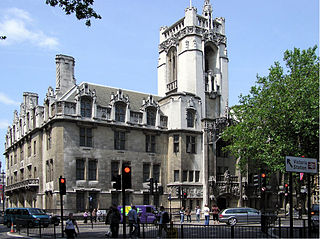Landmark court decisions, in present-day common law legal systems, establish precedents that determine a significant new legal principle or concept, or otherwise substantially affect the interpretation of existing law. "Leading case" is commonly used in the United Kingdom and other Commonwealth jurisdictions instead of "landmark case" as used in the United States.

Territories of the United States are sub-national administrative divisions overseen by the federal government. They differ from U.S. states and Native American tribes, which have limited sovereignty. The territories are classified by incorporation and whether they have an "organized" government through an organic act passed by Congress.

Thomas Henry Bingham, Baron Bingham of Cornhill, was an eminent British judge and jurist who served as Master of the Rolls, Lord Chief Justice and Senior Law Lord. He was widely recognized as the greatest judge and lawyer of his generation. Baroness Hale of Richmond observed that his pioneering role in the formation of the United Kingdom Supreme Court may be his most important and long-lasting legacy. Lord Phillips of Worth Matravers regarded Bingham as 'one of the two great legal figures of my lifetime in the law'.

The Chagossians are people of African origin, who inhabited the Chagos Islands, specifically Diego Garcia, Peros Banhos, and the Salomon island chain, as well as other parts of the Chagos Archipelago, from the late 18th to the late 20th century. Most Chagossians now live in Mauritius and the United Kingdom after being forcibly evicted by the British government in the late 1960s and early 1970s so that Diego Garcia, the island where most Chagossians lived, could serve as the location for a United States military base. Today, no Chagossians live on the island of Diego Garcia, as it is now the site of the military base Camp Justice.

The King-in-Council or the Queen-in-Council, depending on the gender of the reigning monarch, is a constitutional term in a number of states. In a general sense, it would mean the monarch exercising executive authority, usually in the form of approving orders, in the presence of the country's executive council.
The Massachusetts Burma Law was a law enacted in 1996 by the Massachusetts legislature limiting state entities from purchasing services from companies doing business with Myanmar (Burma). A "restricted trade" list was compiled by the Commonwealth, which included 34 members of the National Foreign Trade Council (NFTC). The NFTC filed suit against then-Massachusetts Secretary of Administration and Finance, Stephen Crosby, in Crosby v. National Foreign Trade Council, 530 U.S. 363 (2000), arguing that the Massachusetts law infringed upon the federal government's foreign affairs and foreign commerce powers, and that it was already pre-empted by federal law. Massachusetts was also charged with violating the Supremacy Clause of the U.S. Constitution. The NFTC won the case with U.S. Supreme Court Justice David H. Souter ruling that "the state Act is preempted, and its application unconstitutional, under the Supremacy Clause." The law was thus nullified.
The Constitutional history of Australia began with the first white settlement in Sydney in 1788 and has undergone numerous constitutional changes since.
Campbell v Hall (1774) 1 Cowp 204, 98 ER 1045 was a case decided in the Court of King's Bench in 1774. On its face it was a private action for recovery of sums paid to a tax agent, but the decision laid down the principles of the King's constitutional authority in a British colony, deciding amongst other things that such authority is absolute until a representative assembly is granted, at which point the authority of the Crown is limited.

The doctrine of legitimate expectation in Singapore protects both procedural and substantive rights. In administrative law, a legitimate expectation generally arises when there has been a representation of a certain outcome by the public authorities to an individual. To derogate from the representation may amount to an abuse of power or unfairness. The doctrine of legitimate expectation as a ground to quash decisions of public authorities has been firmly established by the English courts. Thus, where a public authority has made a representation to an individual who would be affected by a decision by the authority, the individual has a legitimate expectation to have his or her views heard before the decision is taken. Alternatively, an individual may also have a legitimate expectation to a substantive right. The recognition of substantive legitimate expectations is somewhat controversial as it requires a balancing of the requirements of fairness against the reasons for any change in the authority's policy. This suggests the adoption of a free-standing proportionality approach, which has been said not to apply in administrative law.

R v Secretary of State for Foreign and Commonwealth Affairs, ex parte Bancoult [2008] UKHL 61 is a UK constitutional law case in the House of Lords concerning the removal of the Chagos Islanders and the exercise of the Royal Prerogative. The Chagos Islands, acquired by the United Kingdom in 1814, were reorganised as the British Indian Ocean Territory (BIOT) in 1965 for the purpose of removing its inhabitants. Under a 1971 Order in Council, the Chagossians were forcibly removed, and the central island of Diego Garcia leased to the United States for use as a military outpost.
Louis Olivier Bancoult is a Chagossian activist who is the leader of the Chagos Refugee Group. He was born in 1964 on the island of Peros Banhos in the Chagos Archipelago, from where he was forcibly removed at the age of 4 and transported to Mauritius. Bancoult is an electrician and an advocate for the juridical right of the Chagossians to return from Mauritius to their original homeland. He has been involved in several high profile legal actions concerning the exile of the Chagos Islanders including R (Bancoult) v Secretary of State for Foreign and Commonwealth Affairs .
R v Secretary of State for Foreign and Commonwealth Affairs, ex p Bancoult [2000] EWHC Admin 413 was a 2000 legal case in which Olivier Bancoult sought a judicial review of the ordinance which allowed the Chaggosian people to be forcibly removed from their homeland. The Divisional Court ruled that the ordinance that allowed the removal was "ultra vires" as the power to legislate for "peace, order and good governance" of the territory did not include a power to expel the inhabitants. However, in R v Secretary of State for Foreign and Commonwealth Affairs, ex p Bancoult this decision was overturned by the House of Lords in a controversial 3-2 judgment.
Zivotofsky v. Clinton, 566 U.S. 189 (2012), is a Supreme Court of the United States decision in which the Court held that a dispute over the regulation of passports was not a political question and thus resolvable by the courts. Specifically, Zivotofsky's parents sought to have his passport read "Jerusalem, Israel", rather than "Jerusalem", as his place of birth. The State Department had rejected that request under a longstanding policy that took no stance on the legal status of Jerusalem. The Court said that Zivotofsky could test the constitutionality of a Congressional law that ordered the Secretary of State to list people born in Jerusalem as born in Israel. This action was taken over the objections of the State Department, which insisted that issues of foreign policy were inherently political and thus not justiciable by the Courts. On remand, the Court of Appeals held in July 2013 that the law was an unconstitutional infringement of the President's recognition powers.

Secretary of State for Foreign and Commonwealth Affairs v Yunus Rahmatullah [2012] UKSC 48 is a UK constitutional law case concerning the detention of Yunus Rahmatullah, a Pakistani citizen detained in Iraq, and later Afghanistan, who is alleged to have travelled to Iraq to fight for Al-Qaeda during the Second Iraq War.

Behrooz v Secretary of the Department of Immigration and Multicultural and Indigenous Affairs, is a decision of the High Court of Australia regarding the detention of asylum seekers in Australia. A 6-1 majority of the Court held that even if the conditions of immigration detention are harsh, such conditions do not render the detention unlawful.
R (Bancoult) v Secretary of State for Foreign and Commonwealth Affairs [2014] WLR (D) 237 is a 2014 legal case concerning the admissibility of a leaked Wikileaks cable as evidence in a dispute over the legality of a marine protected area in the British Indian Ocean Territory.

R v Secretary of State for Foreign and Commonwealth Affairs [2016] UKSC 35 was a 2016 judgment of the Supreme Court of the United Kingdom that affirmed the decision of the House of Lords in R v Secretary of State for Foreign and Commonwealth Affairs, ex p Bancoult despite new evidence subsequently coming to light.

R (Miller) v Secretary of State for Exiting the European Union [2017] UKSC 5 is a UK constitutional law case decided by the United Kingdom Supreme Court on 24 January 2017, which ruled that the UK Government may not initiate withdrawal from the European Union by formal notification to the Council of the European Union as prescribed by Article 50 of the Treaty on European Union without an Act of the UK Parliament permitting the government to do so. Two days later, the government responded by bringing to Parliament the European Union Bill 2017 for first reading in the House of Commons on 26 January 2017. The case is informally referred to as "the Miller case" or Miller's case.
Professor Anthony W. Bradley QC is a leading expert in UK constitutional law, social security and human rights. He was professor of law at the University of Edinburgh and co-author of the leading textbook on Constitutional and Administrative Law in the United Kingdom. He is a tenant at Cloisters Chambers in London.











